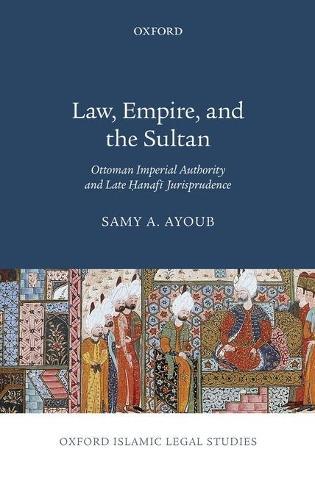Full Product Details
Author: Samy A. Ayoub (Assistant Professor of Law and Middle Eastern Studies, Assistant Professor of Law and Middle Eastern Studies, The University of Texas at Austin)
Publisher: Oxford University Press Inc
Imprint: Oxford University Press Inc
Dimensions:
Width: 23.60cm
, Height: 2.30cm
, Length: 15.70cm
Weight: 0.499kg
ISBN: 9780190092924
ISBN 10: 0190092920
Pages: 216
Publication Date: 31 January 2020
Audience:
Professional and scholarly
,
Professional & Vocational
Format: Hardback
Publisher's Status: Active
Availability: To order

Stock availability from the supplier is unknown. We will order it for you and ship this item to you once it is received by us.
Reviews
Professor Ayoub's Law, Empire, and the Sultan is an important contribution to the study of late Hanafism in the Ottoman Empire, and a very welcome complication of cliched claims that Islamic Law was purely a jurists law. This book is both an important contribution in Islamic legal history and to our understanding of the role of the state in the jurisprudence of Islamic law. * Mohammad Fadel, Professor of Law, University of Toronto Faculty of Law * In Law, Empire, and the Sultan, Samy Ayoub offers a fresh perspective on two of the most widely debated issues in Islamic legal history: the relationship between fiqh as a 'jurists' law and the authority of temporal rulers, and the process of codification. The study adds substance to the growing recognition that the rise of the nation state did not represent a sudden rupture in the development of Islamic legal discourses, but was preceded by significant developments in scholarly attitudes toward the legal authority of rulers. Rather than focusing on the agency of the Ottoman state, Ayoub offers a perspective from within the intellectual and religious world of Ottoman legal scholars. * Marion Katz, Professor of Middle Eastern and Islamic Studies, New York University * Samy Ayoubs book is an important contribution to the growing field of Ottoman legal studies. Using the writings of what he calls 'late Hanafis', Ayoub demonstrates that the Ottoman sultan played an active role in shaping the empires legal system. This distinctive tradition of legal thinking was the basis from which nineteenth century legal reform and codification began. This book is a required reading for anyone interested in Islamic legal history, Ottoman history, and the origins of legal modernity in the Middle East. * Adam Sabra, Professor and King Abdul Aziz Ibn Saud Chair in Islamic Studies, University of California, Santa Barbara *
Ayoub's meticulous study casts a much-needed light on the creativity and innovation of the late Hanafi tradition. By focusing on the tradition from within, Law, Empire, and the Sultan makes a significant contribution to the scholarly debate on the nature of the Islamic legal order in general and in recent centuries in particular. -- Guy Burak, Librarian for Middle Eastern, Islamic and Jewish Studies, New York University Professor Samy Ayoub's Law, Empire, and the Sultan challenges the view that Muslim jurists operated outside of political authority by showing how Ottoman Hanafi scholars from the sixteenth to nineteenth centuries endorsed the Sultan's role in lawmaking.A This rich account of late Hanafi jurisprudence should appeal to those with interests in Islamic law, Ottoman history, and processes of legal change. -- Shirin Sinnar, Professor of Law, Stanford Law School Samy Ayoub's book is an important contribution to the growing field of Ottoman legal studies. Using the writings of what he calls 'late Hanafis,' Ayoub demonstrates that the Ottoman sultan played an active role in shaping the empireas legal system. This distinctive tradition of legal thinking was the basis from which nineteenth century legal reform and codification began. This book is a required reading for anyone interested in Islamic legal history, Ottoman history, and the origins of legal modernity in the Middle East. -- Adam Sabra, Professor and King Abdul Aziz Ibn Saud Chair in Islamic Studies, University of California, Santa Barbara In Law, Empire, and the Sultan, Samy Ayoub offers a fresh perspective on two of the most widely debated issues in Islamic legal history: the relationship between fiqh as a 'jurists law' and the authority of temporal rulers, and the process of codification. The study adds substance to the growing recognition that the rise of the nation state did not represent a sudden rupture in the development of Islamic legal discourses, but was preceded by significant developments in scholarly attitudes toward the legal authority of rulers. Rather than focusing on the agency of the Ottoman state, Ayoub offers a perspective from within the intellectual and religious world of Ottoman legal scholars. -- Marion Katz, Professor of Middle Eastern and Islamic Studies, New York University Professor Ayoub's Law, Empire, and the Sultan is an important contribution to the study of late Hanafism in the Ottoman Empire, and a very welcome complication of cliched claims that Islamic Law was purely a jurists' law. This book is both an important contribution in Islamic legal history and to our understanding of the role of the state in the jurisprudence of Islamic law. -- Mohammad Fadel, Professor of Law, University of Toronto Faculty of Law
Author Information
Samy A. Ayoub is an Assistant Professor of Law and Middle Eastern Studies at the University of Texas at Austin.




